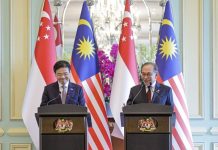
KPMG in Singapore and the Singapore Institute of Directors (SID) have jointly released their Budget 2025 Proposal, “Designing Singapore’s Future Together: Ready, Refreshed, and Resilient for Tomorrow.”
This comprehensive blueprint offers strategic recommendations to position Singapore as a global leader in value creation by attracting talent, investments, and innovation while leveraging capital markets to foster economic growth.
A central theme of the proposal is enhancing corporate governance standards to build investor confidence and position enterprises as benchmarks for integrity and transparency.
By fostering trust and accountability across the business ecosystem – from multinational corporations to small and medium enterprises (SMEs) – Singapore can lay the foundation for inclusive, sustained growth.
The proposal also emphasises the importance of incentivising research and development, along with green financing, to accelerate innovation and address the pressing challenges of sustainability.
To support businesses in navigating these transitions, KPMG and SID have introduced a “fast pass” approach. This initiative provides companies with ready-to-use templates, swift assistance, and structured support systems to simplify their adoption of advanced technologies and sustainable practices.
Such measures aim to fortify Singapore’s global reputation as a hub for value creation and innovation.
Key Areas of Focus
The Proposal centres on three core areas: advancing sustainability, uplifting workforce capabilities, and driving innovation. By addressing these interconnected priorities, Singapore can maintain its competitive edge in an increasingly complex global landscape.
The first focus area highlights the urgent need for businesses to adopt sustainable practices.
Recommendations include increasing transparency in carbon tax revenue allocation, establishing a centralised ESG (Environmental, Social, and Governance) reporting hub, and offering incentives for blended finance to support large-scale green projects.
A decarbonisation assistance facility is also proposed, providing grants and affordable loans to help businesses in hard-to-abate sectors adopt cleaner energy solutions and improve energy efficiency.
The second area stresses the importance of workforce development. Strengthening leadership pipelines through initiatives such as a National Leadership Competency Index is critical to equipping Singapore’s workforce with the skills required to tackle future challenges.
Expanding micro-credentialling programmes in areas such as artificial intelligence, cybersecurity, and sustainability will address immediate skills gaps. Additionally, regular and rigorous board evaluations, guided by external facilitators, will enhance corporate governance and transparency.
The final area focuses on fostering innovation to ensure Singapore remains a leader in the global economy. Increased funding for AI governance and ethical deployment training will encourage responsible adoption of emerging technologies.
Companies are also urged to enhance the capabilities of their directors to navigate ESG complexities and develop innovative strategies. Strengthened tax governance is proposed as a core component of corporate governance, ensuring businesses benefitting from incentives align with international standards.
Lee Sze Yeng, Managing Partner of KPMG in Singapore, underscored the importance of leadership in addressing sustainability and technological advancement: “As Singapore enters SG60, nurturing leaders with foresight and expertise is critical. Structured apprenticeships, micro-credentialling, and a National Leadership Competency Index will create a robust leadership pipeline to support local and regional growth.”
Ajay Kumar Sanganeria, Partner and Head of Tax at KPMG in Singapore, highlighted systemic changes needed to drive transformation: “Singapore must accelerate green infrastructure development using diverse financing instruments and adopt a fast-pass approach to support businesses in their sustainability and technology transitions.
“Tax policies should also incentivise R&D to ensure the nation leads in ESG and technological advancements.”
Terence Quek, CEO of SID, emphasised the role of directors in driving sustainability:
“Directors play a pivotal role in integrating ESG principles into business strategies, fostering a culture of sustainability and innovation. By aligning profitability with societal expectations, they drive long-term value creation.”
Neil Parekh, Governing Council Member of SID, noted the critical role of capital markets in value creation: “Public and private financing markets are engines of value creation. Directors must strategically leverage these to fund innovation and sustainable growth, ensuring investments benefit all stakeholders.”
The joint Budget 2025 Proposal by KPMG and SID provides a forward-looking roadmap for Singapore’s continued leadership in value creation. By focusing on sustainability, workforce development, and innovation, the recommendations aim to build a resilient and adaptable nation ready to tackle the challenges of tomorrow.
























